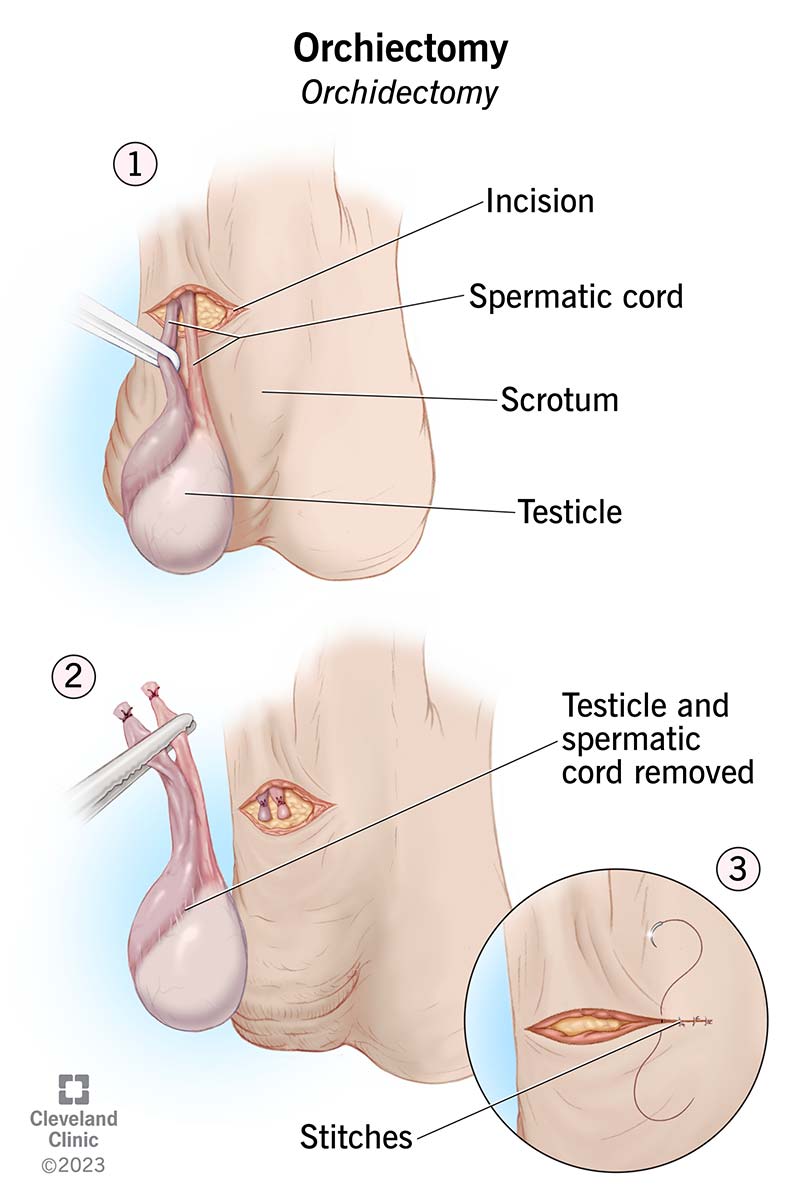An orchiectomy is a surgical procedure to remove one or both testicles. Providers use this procedure to treat and prevent testicular cancer as well as to treat male breast cancer and prostate cancer. Orchiectomies usually don’t require an overnight hospital stay.
Advertisement
Cleveland Clinic is a non-profit academic medical center. Advertising on our site helps support our mission. We do not endorse non-Cleveland Clinic products or services. Policy

Image content: This image is available to view online.
View image online (https://my.clevelandclinic.org/-/scassets/images/org/health/articles/orchiectomy)
An orchiectomy (or orchidectomy) is a surgical procedure to remove one or both testicles. Testicles are two small organs that hang in a sac of skin (scrotum) below your penis. Testicles (or testes) make sperm and male hormones like testosterone.
Advertisement
Cleveland Clinic is a non-profit academic medical center. Advertising on our site helps support our mission. We do not endorse non-Cleveland Clinic products or services. Policy
Healthcare providers perform orchiectomies to treat or prevent testicular cancer, prostate cancer and male breast cancer. Usually, an orchiectomy is an outpatient procedure, so you go home the same day.
Healthcare providers use orchiectomies to:
Providers perform orchiectomies at a surgical center or a hospital. Most commonly, they use general anesthesia (to put you to sleep for the procedure). You won’t feel pain during surgery.
Advertisement
Your healthcare provider cleans the area and makes an incision (cut). The location of the incision depends on the technique your healthcare provider uses. The incision may be in your pubic area (inguinal orchiectomy) or in your scrotum (simple orchiectomy). Your healthcare provider may remove:
If you choose to have a prosthetic testicle, your provider will place the new testicle inside your scrotum. The prosthetic testicle is filled with salt water (saline).
At the end of the procedure, your provider closes the incision with stitches. After the surgery, you’ll need to wait in the recovery room until you’re ready to leave. Most people go home the day of surgery.
Since you’re asleep under anesthesia for the procedure, you won’t feel pain. You may feel discomfort during the recovery period. Talk to your healthcare provider about pain medications and other ways to relieve discomfort in the days and weeks after an orchiectomy.
Usually, the entire procedure takes between 30 to 60 minutes.
You’ll need someone to drive you home after surgery. The entire recovery process usually takes several weeks. You’ll need to schedule a follow-up visit with your healthcare provider after the procedure. As you recover, you should:
Advertisement
For people with testicular cancer, orchiectomy is an effective treatment to remove the tumor and analyze the tissue for cancer. For breast and prostate cancer, it’s an effective treatment to lower hormone levels as part of a larger treatment strategy. But a sudden decrease in hormones due to removing your testicles can have side effects. Talk to your healthcare provider about ways to manage these side effects.
As with any surgical procedure, the risks of an orchiectomy include bleeding and infection. You may have side effects like swelling and pain. Complications and side effects of an orchiectomy depend on the type of surgery you had.
Some of the side effects from orchiectomy result from a decrease in hormone levels (typically when both testicles are removed). While rare, a drop in testosterone and other male hormones can lead to:
People who have both testicles removed (a bilateral orchiectomy) can’t produce sperm. This procedure makes them infertile.
An orchiectomy can affect how you feel about yourself and how you feel about sex. It’s normal to have these types of emotions after surgery. Talk to your healthcare provider about the psychological side effects of surgery. They can recommend ways to help you cope.
Advertisement
It’s essential to make sure your incision heals completely before resuming physical activities, including sex. Healthcare providers usually recommend that you wait three to four weeks. Until then, you shouldn’t play sports, run or lift anything heavy. Ask your healthcare provider when you can get back to the activities you enjoy.
After an orchiectomy, call your healthcare provider right away if you:
If you’re having hot flashes, fatigue or problems with sexual function, call your healthcare provider. These symptoms can occur after a drop in hormone levels. Talk to your healthcare provider about taking hormone supplements, which may relieve these symptoms.
It’s normal to have questions about the surgery, no matter why you're having it. Be sure to discuss the procedure with your healthcare provider so you know exactly what to expect. They'll go over the risks and benefits of the surgery as well as how you can best recover after surgery.
Advertisement

Sign up for our Health Essentials emails for expert guidance on nutrition, fitness, sleep, skin care and more.
Learn more about the Health Library and our editorial process.
Cleveland Clinic’s health articles are based on evidence-backed information and review by medical professionals to ensure accuracy, reliability and up-to-date clinical standards.
Cleveland Clinic’s health articles are based on evidence-backed information and review by medical professionals to ensure accuracy, reliability and up-to-date clinical standards.
If you have a condition that’s affecting your urinary system, you want expert advice. At Cleveland Clinic, we’ll work to create a treatment plan that’s right for you.
